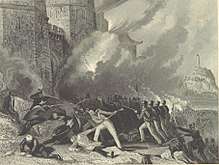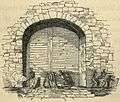Battle of Chinkiang
The Battle of Chinkiang was fought between British and Chinese forces in Chinkiang (Zhenjiang), Jiangsu province, China, on 21 July 1842 during the First Opium War. It was the last major battle of the war. The Chinese force consisted of a garrison of Manchu and Mongol Bannermen.[7] In command of the British forces was Sir Hugh Gough. Leading one brigade was future British field marshal Sir Colin Campbell.[8] The British capture of this stronghold allowed them to proceed to Nanking. Fought near the confluence of the Grand Canal and Yangtze River, the battle effectively blocked operation of the Caoyun system, a transport network vital for the movement of grain throughout the empire. As a result, the Daoguang Emperor decided to sue for peace and agreed to sign the Treaty of Nanking, which brought hostilities to an end. Mass suicide was committed by the Manchu Bannermen who were defending the city.[9]
| Battle of Chinkiang | |||||||
|---|---|---|---|---|---|---|---|
| Part of the First Opium War | |||||||
 British troops taking Chinkiang from Qing troops | |||||||
| |||||||
| Belligerents | |||||||
|
| |||||||
| Commanders and leaders | |||||||
| Hugh Gough | Hai Ling †[1] | ||||||
| Strength | |||||||
| 6,907 troops[2] | 3,000–4,000 troops (est.)[3] | ||||||
| Casualties and losses | |||||||
Land:[4]
| 1,000 killed or wounded[6] | ||||||
Battle
In mid July, the British ships concentrated on Chinkiang and blocked the route between the Yangtze River and the Grand Canal. On the morning of July 21, the British attacked Chinkiang City in three directions with four brigades. With the support of artillery brigade, 2,310 soldiers of the first brigade attacked the Qing army guarding the outside of Chinkiang City; 1,832 soldiers of the second brigade attacked the west gate with the support of navy; 2,155 soldiers of the third brigade attacked the north gate. At this time, there were 1,583 Bannermen in Chinkiang and 2,700 Green Standard Army in the southwest suburb. The Green Standard Army were transferred from other provinces after the fort outside the city was attacked and the situation in Chinkiang was tense. The Green Standard Army, who were temporarily concentrated, were not familiar with the terrain of Chinkiang. Their weapons are all swords and spears, except for a small number of muskets.
At 7 a.m. the British third brigade landed in Beigu mountain, and then attacked the north gate, which was covered by the British ship's heavy artillery. The Bannermen guarding the north gate immediately shot with muskets, hitting and injuring two British captains. The Bannermen dismantled some battlements and temporarily set up artillery to counterattack the British army. More than an hour after the fierce battle, the artillery of the Bannermen was destroyed, and the British troops rushed to the battery from the side. The garrison fought with the British on the wall of the city.
Before dawn, the first brigade successfully landed and occupied the highlands near Jinshan. At 8 a.m., the British began their attack on the Green Standard Army stationed outside the city. These Green Standard Army came to reinforce the city from afar. Because of their tired journey and lack of food, they were defeated by the British army after fierce battle. Many Green Standard Army soldiers became deserters. The commander of Green Standard Army saw the fire in Chinkiang City and thought that the city had been lost, so he ordered the remaining soldiers to retreat.
The west gate is the main battlefield for the British to attack the city. Shortly after the battle between the north gate and the southwest suburb, the second brigade began to attack the west gate. The British soldiers of the two regiments occupied some houses outside the city to shoot at the garrison under the cover; meanwhile, the transport ship carrying the British marines drove along the canal to the west gate, where they planned to attack the city. The west gate garrison fired at the British Army on land and the Marine Corps in the canal, injuring 16 sailors, 8 gunners and an officer and forcing the British army to withdraw from the canal within 10 minutes. After that, the British army sent another 200 Marines to cooperate with the land force to attack Chinkiang city again, this time they successfully occupied part of the city buildings. The defenders fought fiercely with the British Army on the city buildings. At noon, the British army sent a team of engineers to blow up the west gate with gunpowder. At the same time, the third brigade of the British Army occupying the north gate rushed to the west gate to fight, and finally the Qing's defense was broken. However, the garrison and the British army had a fierce street battle in the city. At least 40 British officers and soldiers were injured or killed in the street war. After the British army completely seized the city, Hai Ling, the supreme commander of the Qing army, and his family committed suicide.[10]
Gallery
 Map of the battle
Map of the battle Rallying of the Tartar troops
Rallying of the Tartar troops Engagement in Chinkiang
Engagement in Chinkiang Escalade in Chinkiang
Escalade in Chinkiang Blowing open the gates of the city
Blowing open the gates of the city Battle memorial at St. George's Cathedral, Madras
Battle memorial at St. George's Cathedral, Madras
Notes
- Waley 1958, p. 197
- Rait 1903, p. 272
- Bingham 1843, p. 353
- Bulletins 1842, pp. 780, 787
- Hall & Bernard 1844, pp. 417–418
- The Chinese Repository, vol. 11, p. 513
- Elliott, Mark (June 1990). "Bannerman and Townsman: Ethnic Tension in Nineteenth-Century Jiangnan". Late Imperial China 11 (1): 36–74.
- Greenwood 2015, p. 496
- John Makeham (2008). China: The World's Oldest Living Civilization Revealed. Thames & Hudson. p. 331. ISBN 978-0-500-25142-3.
- "鸦片战争之镇江战役 - 美篇". www.meipian.cn. Retrieved 25 March 2020.
References
- Bulletins of State Intelligence. Westminster: F. Watts. 1842.
- The Chinese Repository. Volume 11. Canton. 1842.
- Bingham, J. Elliot (1843). Narrative of the Expedition to China, from the Commencement of the War to Its Termination in 1842 (2nd ed.). Volume 2. London: Henry Colburn.
- Greenwood, Adrian (2015). Victoria's Scottish Lion: The Life of Colin Campbell, Lord Clyde. UK: History Press. ISBN 0-75095-685-2.
- Hall, William Hutcheon Hall; Bernard, William Dallas (1844). Narrative of the Voyages and Services of the Nemesis, from 1840 to 1843. Volume 2. London: Henry Colburn.
- Rait, Robert S. (1903). The Life and Campaigns of Hugh, First Viscount Gough, Field-Marshal. Volume 1. Westminster: Archibald Constable.
- Waley, Arthur (1958). The Opium War Through Chinese Eyes. Woking, Surrey: George Allen & Unwin. ISBN 0-04-951012-6.